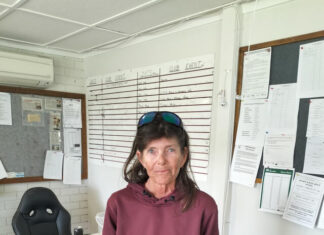
Darcy Meek, a Year 8 student at Warwick’s SCOTS PGC College, will experience the trip of a lifetime when he travels to France and Belgium with the College Choir and Pipes and Drums band to perform at the ANZAC services in 2013.
Darcy is the son of Jeff and Maryann Meek of Warwick and brother of Amelia and Belle. His great-aunt, Valerie Arthy, has researched the family history and given him the location of his great-great-great Uncle Joseph’s Memorial at the Somme, to visit and pay homage.
The SCOTS PGC band and choir have been selected by the Australian Government, along with Brisbane’s Faith Lutheran College, as the two Queensland schools to perform in Villers-Bretonneux, France, at the Australian Memorial on ANZAC Day 2013.
The trip will include a week in Italy, three days in Salzburg, and then on to France to give performances in the lead-up to ANZAC Day.
In France, the SCOTS PGC group will participate, in conjunction with Faith Lutheran College, in the “La Flamme” ceremony beneath the Arc de Triomphe on April 17.
Moving on to Ypres, the group will visit the “In Flanders Field” museum followed by a battlefields tour, before performing in the “Last Post” ceremony at Menin Gate.
On Monday, April 22, the group will arrive at Albert where they will spend five days giving Darcy and his grandmother, Claire Meek, who is accompanying him on the trip, the opportunity to visit the Somme battlefields where his great-great-great uncle, Private Joseph William Thomas Woodruff of the British Army’s 88th Company, Machine Gun Corp (Infantry), died in battle on October 19 1916, aged 24.
The battle in which Joseph fell was one of the bloodiest campaigns of World War I when, over a period of five months, there were more than 420,000 British casualties, 195,000 French and 640,000 German.
Over 20,000 British troops died on the first day of the offensive, when British General Haig ordered his troops to advance into a maelstrom of German machine gun and shell fire and fierce enemy resistance.
Such was the slaughter that Wilfred Owen (1993-1915), the wartime poet of the time, said this in his epic poem “Anthem for a Damned Youth”:
“No mockeries now for them; no prayers nor bell
Nor any voice of mourning save the choirs.
The shrill demented choirs of wailing shells:
And bugles calling them from sad shires.”
Private Joseph Woodruff’s body was never found, as were 72,000 other British and allied dead and missing in the Somme battles, but Darcy and his Grandmother will find the time to travel to Thiepual, a small village about 8km from Albert, which has a Memorial that includes Joseph’s name.
The Woodruff family sacrificed two other brothers of Joseph when brother, Harry Charles Woodruff, a British Royal Marine fell at Gallipoli on November 3, 1915 and is believed to be buried at Helles, Gallipoli.
Another brother, Harold Alfred Woodruff, was killed in action with the Royal Navy in a battle with a Turkish Destroyer in the Dardenelles on May 13, 1915.
He was buried at sea, and his name is enshrined on the Plymouth Naval Memorial in London.
The battlefields of France and Belgium are littered with memorials and cemeteries and it is a special privilege and unique opportunity to honour those young men who left our shores in 1915, with 50,000 never to return.
The Memorial at Villers-Bretonneux has special significance to Australia, and has become famous in local folklore since 1918, when the Australian 4th and 5th Divisions, with Units of the 8th and 18th Divisions that halted the German advance, recaptured the village on August 8, 1918.
The Australian Memorial at Villers-Bretonneux was erected to honour and commemorate the 10,765 Australian soldiers who fought in France and Belguim during World War 1.
Recent discoveries of unmarked gravesites could see more names of AIF men included on this Memorial. When another famous wartime poet, Rupert Brooke (1887-1918), wrote: “There’s some corner of a foreign field that is forever England”, perhaps Villers-Bretonneux could become Australia’s corner in a foreign field.
Whatever young Darcy and his Grandmother experience from this exciting trip, it is certain to be both poignant and emotional and leave an indelible print in their memory.
To walk in the footsteps of brave ancestors of nearly 100 years ago would be an awesome experience.
Just to be overlooking those sacred grounds of the Somme where so many British and Australians died those many years ago will be an unforgettable occasion, and perhaps bring some disclosure and a better understanding of the futility of war.







